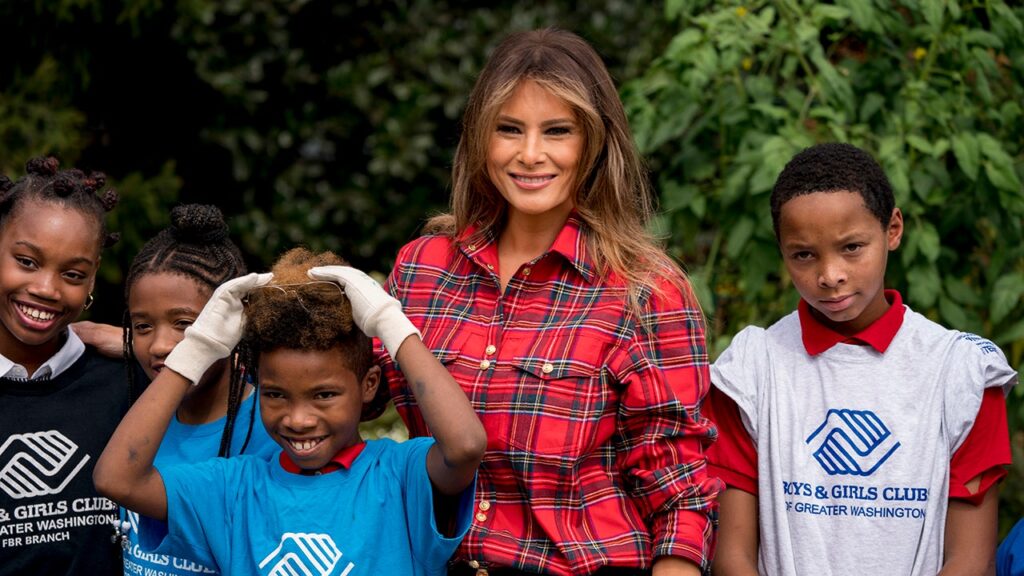On Friday, First Lady Melania Trump made a significant announcement concerning the welfare of foster youth, revealing that a substantial investment of $25 million will be allocated in the fiscal year 2026 budget proposed by President Donald Trump. These funds will be directed towards the U.S. Department of Housing and Urban Development (HUD) under the “Foster Youth to Independence” program. The primary aim of these resources is to support young individuals who are transitioning out of the foster care system, thereby ensuring they have access to essential housing services, as stated in a press release from the First Lady’s office.
Expressing her commitment to this cause, Melania Trump stated, “I am proud to have successfully secured $25 million to provide housing for individuals aging out of foster care.” This statement reflects her deep concern for the welfare of children in the foster system, emphasizing not only the importance of providing a safe living environment but also the need for these young individuals to maintain their autonomy and well-being. She further stated that this initiative is part of a broader effort to ensure the safety and welfare of those within the foster community, positing it as another critical measure to promote their independence.
This investment coincides with the seventh anniversary of Melania Trump’s “BE BEST” initiative, a program she initiated during the first Trump administration which seeks to foster the well-being of children. The First Lady remarked on the initiative’s accomplishments, noting the commitment of HUD Secretary Scott Turner to provide thousands of youths transitioning out of the foster care system with housing and support services that promote stability and self-sufficiency.
Scott Turner expressed gratitude to the First Lady for her dedicated efforts. He acknowledged her BE BEST initiative and highlighted the importance of public-private partnerships that are positively impacting the lives of foster youth. “This dedicated funding for foster youth is a game-changer,” Turner remarked, indicating that the financial support will provide essential resources, including short-term housing assistance, which is crucial in preventing homelessness among these young adults.
In conjunction with her announcement on foster youth welfare, President Trump also signed a presidential proclamation designating May 2025 as National Foster Care Month. The First Lady expressed her appreciation for the families, caregivers, and advocates who provide the vital shelter and stability necessary for children’s development. She acknowledged the tireless dedication of American foster families who play an instrumental role in fostering children’s potential, emphasizing their irreplaceable contributions to society.
In her advocacy for children’s welfare, Melania Trump also recognized the importance of preventive measures. During his first term, President Trump signed The Family First Prevention Services Act into law, which focuses on preventing children from entering foster care by funding evidence-based preventive services. This legislative effort aligns with the ongoing initiatives spearheaded by the First Lady, reinforcing a comprehensive approach to support for youth in vulnerable situations.
On a parallel note, earlier in the week, Mrs. Trump honored military mothers at the White House, a poignant event celebrated just before Mother’s Day. Her remarks at this gathering highlighted the profound strength and capability of women—a power rooted in love, compassion, and resilience. “The sacred strength of women is a profound force,” said Mrs. Trump, emphasizing the nurturing role they play in shaping the future. She affirmed that this nurturing capability acts as a beacon of hope for forthcoming generations, seemingly intertwining the themes of motherhood and child welfare.
Overall, Melania Trump’s efforts through her announcement and the accompanying events encapsulate a strong commitment to both the foster youth community and the broader initiatives promoting children’s well-being. By securing funding and prioritizing housing for vulnerable populations, she not only addresses immediate needs but also champions a proactive approach to fostering resilience and stability among youth transitioning out of the foster care system.



